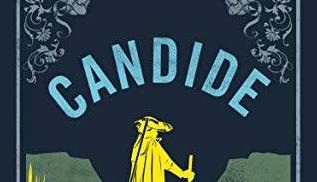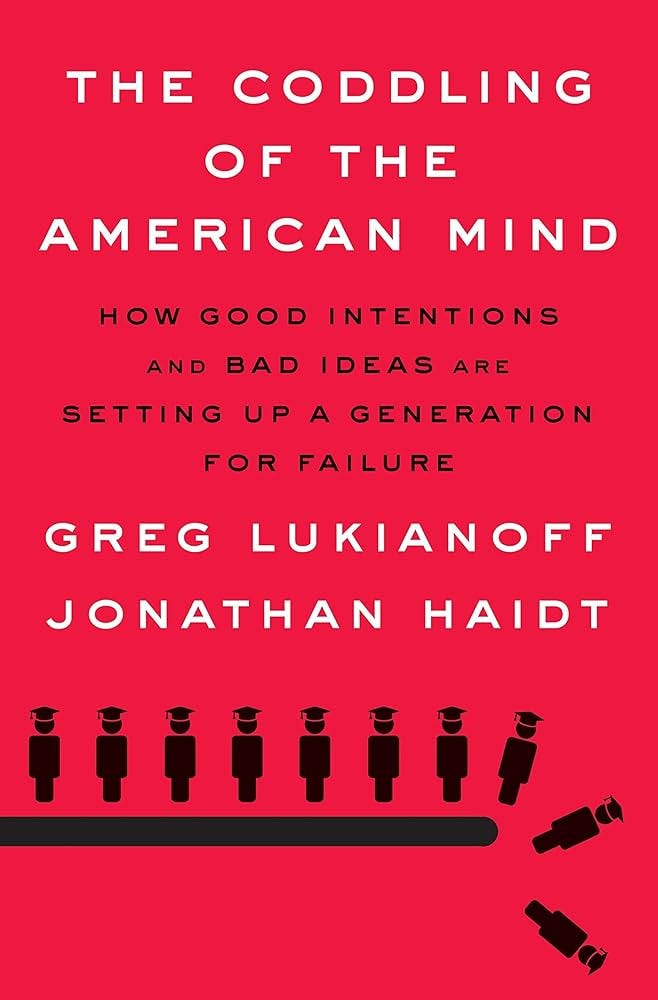What to Read Next: Books That'll Make You Think
Issue #303, featuring "Candide" and "The Coddling of the American Mind"
Happy Friday, readers!
I love when a book makes me think deeply about the world and when it forces me to encounter my own long-held ideas and opinions with a more critical view. As we’re entering a big election year, being able to do this only becomes more important. Confronting big and challenging ideas in the written word is, I think, one of the best things you can do.
I read both of these books over the summer and still find myself pondering the ideas within. They didn’t necessarily challenge my worldview or anything — they weren’t earth-shattering — but they did push me to think a bit deeper about our world and our modern era.
Let’s get to it.
Candide by Voltaire
“And yet there is some good in the world.”
Published: 1759 | Pages: 133 | Genre: Fiction (Philosophical)
I made it through high school and a college religion/philosophy program without ever reading Voltaire, but it always felt like a bit of a gap in my knowledge (especially given my religious studies major). Though it’s decreasingly assigned to students, Candide is still often considered one of the great works of fiction of all time. Even if you haven’t read it, you’ve likely heard of it.
Our Denver book club read it this summer and had wildly differing opinions — it’s among the most polarized we’ve ever been, actually. And that’s because Candide is a weird little novel.
The characters — Candide and a cast of a few others — are basically run through an assortment of horrible and rather graphic torturings, maimings, and more. Through it all, Candide ponders the idea that, in spite of all the terrible things, this existence is “the best of all possible worlds.”
The main idea is to basically consider the point of life when we live in a world filled with awful things. Do we give up? Do we continue on in full optimism and ignorance? Or something more nuanced? Thankfully, Voltaire leaves that question unanswered and allows readers to inject their own meaning.
I found it funny, disturbing, complex, weird, touching, insightful, and quite thought-provoking. It’s rather telling, in a good way, that such a slim story can bring forth all those feelings.
Ultimately, Candide made for a fascinating book club discussion. Regardless of the varied ratings — we ran the gamut from unrated to 5 stars — everyone agreed that the conversation about the book made it a far richer and more meaningful experience than had we all read it solely as individuals.
It was confounding at times, but I sure enjoyed the ride and the ideas have stuck with me. Given its brevity, I can absolutely see reading Candide again. I understand why this kind of experimental satire wouldn’t be to everyone’s taste, but I found it worthwhile and then some.
The Coddling of the American Mind by Jonathan Haidt and Greg Lukianoff
“Education should not be intended to make people comfortable; it is meant to make them think.”
Published: 2018 | Pages: 352 | Genre: Non-Fiction (Society)
If you’re looking for a rational, even-handed, and thought-provoking critique of modern society, look no further than 2018’s The Coddling of the American Mind. While both authors admit their Democratic political views, the primary thrust of the book details how American culture has villainized the very idea of exposure to differing ideas. That’s right: Haidt and Lukianoff take on cancel culture and trigger warnings.
It is, no doubt, a fraught subject. As I was reading, there were a number of times I thought, I wouldn’t publicly touch that subject with a ten-foot pole. Some of the anecdotes and opinions will make you squirm — as they did me — but in a good way. It’s worth noting that there’s nothing inflammatory or disrespectful found within. Most of the time, though, I found myself nodding in agreement with their ideas and findings. As they readily point out, American people aren’t as extreme as far left or far right culture would have you believe. Most of us are moderates.
Their narrative really hones in on the college experience, where these cultural effects are most apparent — Republican-leaning speakers being literally canceled, professors coming under fire for exposing students to “dangerous” ideas, etc. — but the ramifications go well beyond the campus. As a parent to a couple of elementary-aged kids, we even see it in the notices teachers provide us about the movies being shown or the second-grade curriculum on our Constitution.
We live in a wild and uniquely stupid era, and The Coddling of the American Mind helps explain a bit about why that is. At times, the book can feel a little too neat and tidy — like if you follow their logic you can’t help but agree with them. (I still found things to disagree with.) But overall, it was an enjoyable and mind-expanding read. I highly recommend it.
Note: This book started as an article in The Atlantic, which means you can preview their thinking before jumping into the book.
That’s it for me this week. Thanks so much for the time and inbox space — I deeply appreciate your readership.
-Jeremy






“Making people think” seems so last century these days. My dad always used to say - when I was growing up in the 70s - that TV should have been the greatest invention ever, giving us all the knowledge of the world on tap. Instead, they used it to sell dog food.
The internet has amplified that to the nth degree. We no longer think, we consume and then fall asleep in our grieving stupidity.
I see it in some of my work here in the UK - editing articles etc. Some come from writers in their 20s, bright kids, but it is so obvious they’ve never read a proper book in their lives. Their sentence construction is either banal to the point at which they disappear as you read them, or so overblown with fancy vocabulary they think they should be using, that they make no sense, and do it tortuously.
I shall be seeking out ‘The Coddling of the American Mind’, because as goes America, so goes the world, pretty much. Though I do wonder for how much longer...
Coddling is a great book. Like you, I felt the conclusions were coercive (that feels like the right word for me, but maybe not for you). That struck me as out of sync with the deep and obvious compassion the authors have for young people. That said, it is a fantastic book to think critically about.
Haidt’s substack - After Babel - is great as well.